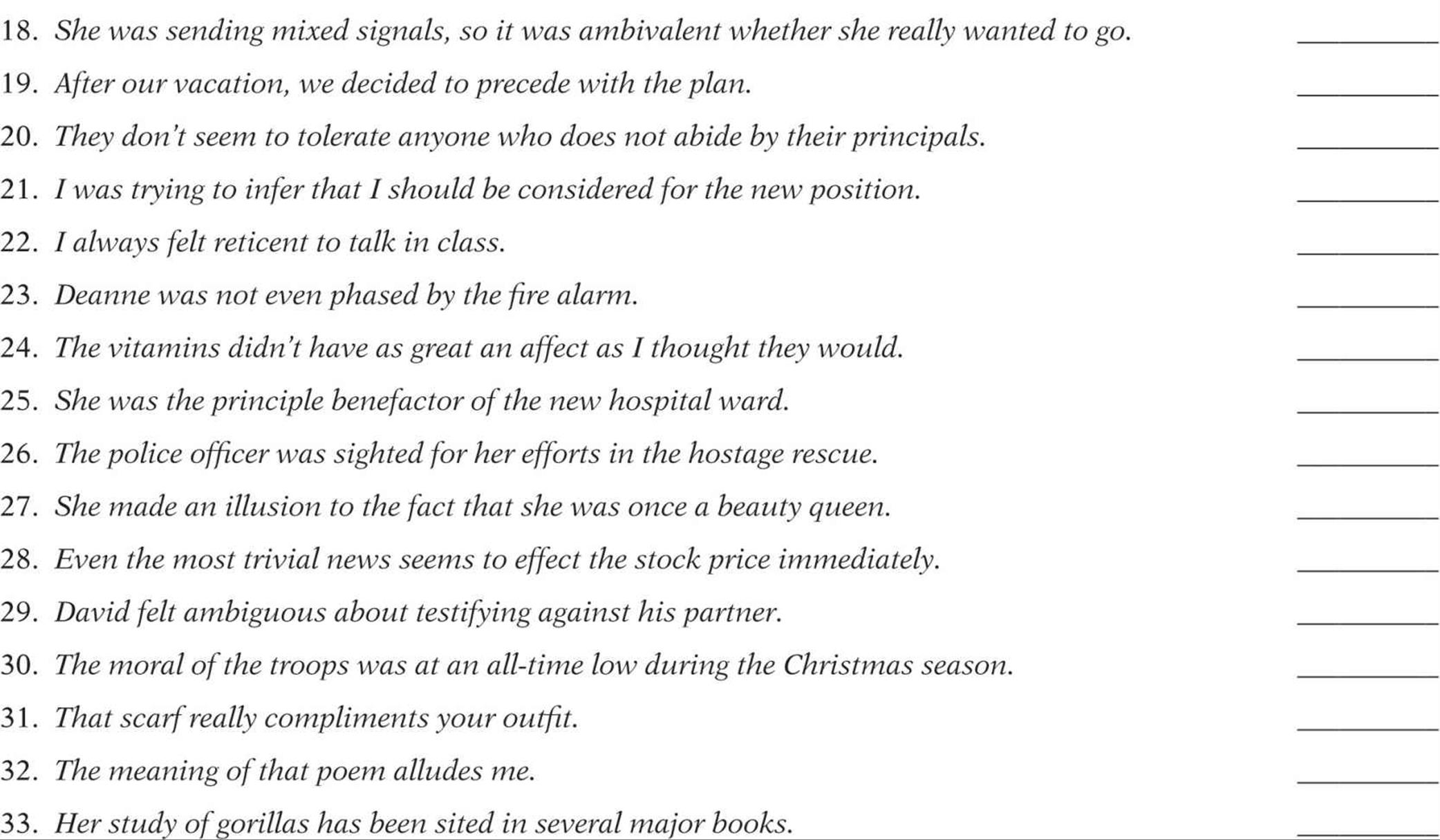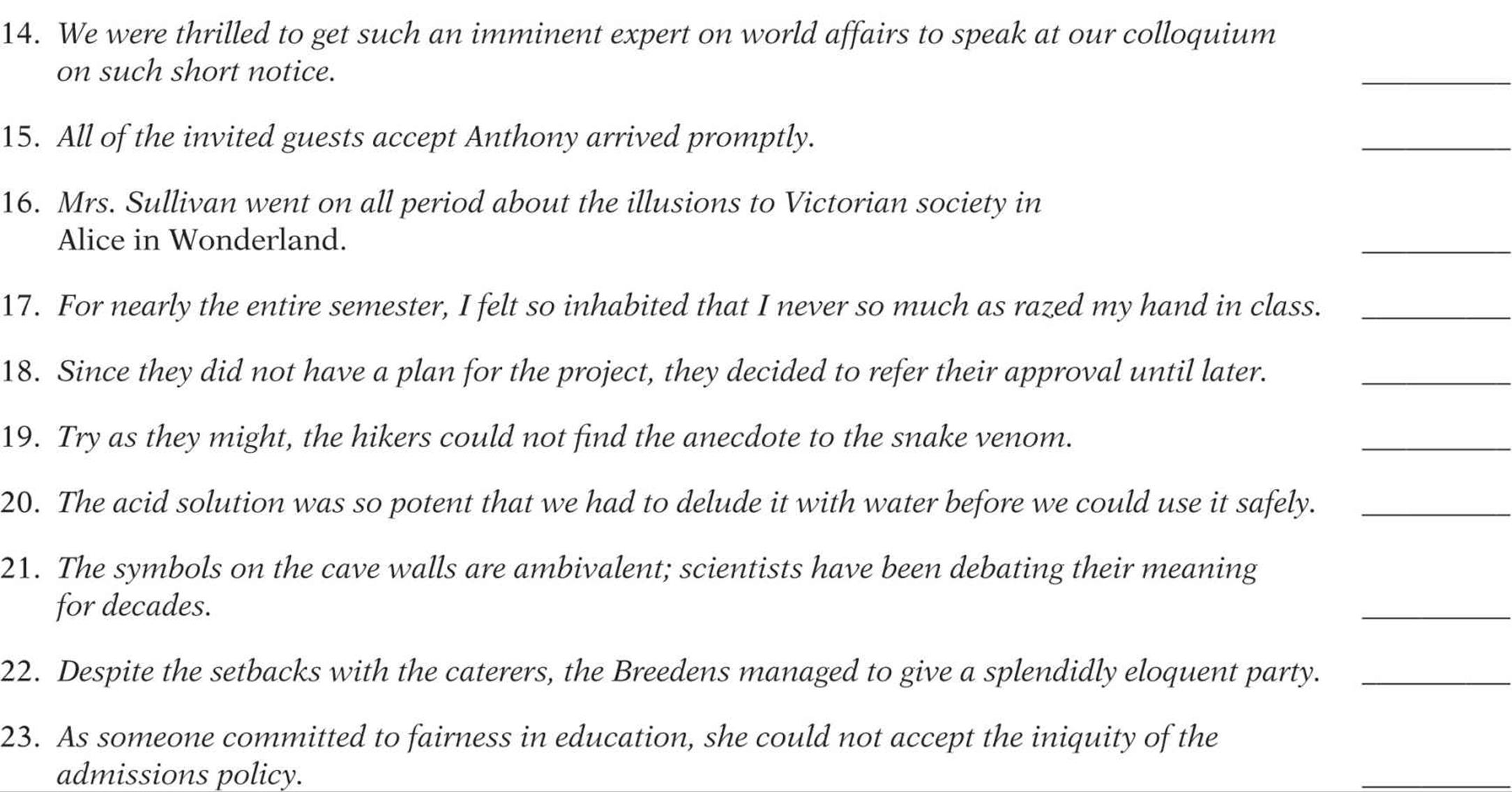SAT Test Prep
CHAPTER 15
ESSENTIAL GRAMMAR SKILLS
Lesson 11: Diction Errors
What Are Diction Errors?
Diction errors are “wrong word” errors. If an SAT sentence contains a word that sounds almost right but not quite, it may well be a diction error. Study this list of words so that you can spot common diction errors.
Commonly Confused Words
accept/except: To accept something means to agree to take it. <accept an offer> To except something is to exclude it.
adapt/adopt/adept: To adapt something means to make it suitable for a particular purpose (from apt, which means appropriate or suitable). To adopt means to choose as one”s own. Someone adept is highly skilled. <an adept player >
affect/effect: To affect means to influence. <It affected me deeply. > An effect is a result or consequence. <It had a good effect. > They are easily confused because to affect means to have an effect on something.
allude/elude/allusion/illusion: To allude to something means to make a subtle or indirect reference to it. To elude something means to escape from it. An allusion is a subtle reference, but an illusion is a deception or misconception.
ambivalent/ambiguous: When you”re ambivalent you have conflicting feelings about something. <I feel ambivalent about the party. > Something ambiguous is unclear or having more than one interpretation. <an ambiguous signal >
cite/site/sight: To cite means to mention as a source of information or to commend for meritorious action. <cite an article in her essay > A site is a place where a planned activity occurs. To sight means to see at a specific location.
compliment/complement: A compliment is a praising personal comment. A complement is something that completes or makes a whole. (Notice the ple in complement and complete.)
council/counsel: A council is a committee. <the executive council > To counsel is to give advice. < He counseled me. >
discrete/discreet: Discrete means distinct.discrete parts.> Someone discreet is prudently modest. <Act discreetly. >
elicit/illicit: To elicit means to bring out or to call forth. <The joke elicited laughter. > Illicit means unlawful.
eminent/imminent: Someone eminent is prominently distinguished. <an eminent historian > Something imminent is about to occur. < imminent doom>
flaunt/flout: To flaunt something means to show it off. <flaunt your talents > To flout something means to show contempt for it. <flout the rules >
gambit/gamut: A gambit is a careful strategy or an opening move. The gamut is the complete range.<run the gamut >
imply/infer: To imply means to suggest or hint at, but to infer means to draw a conclusion from evidence.
its/it”s, their/they”re, whose/who”s, your/you”re: Apostrophes can show possession (as in David”s bike) or indicate missing letters in a contraction (as in can”t as a contraction of cannot). In each of the confusing word pairs above, apostrophes indicate contraction, not possession: it”s = it isor it has, they”re = they are, you”re = you are, and who”s = who is or who has. The possessives are the ones without apostrophes.
morale/moral: Morale (n: mor-AL) is shared enthusiasm for and dedication to a goal. < The team”s morale was very high after the win. > A moral (n: MOR-al) is a lesson or principle about good behavior. <The story had a nice moral. >
phase/faze: A phase is a stage in a process. <third phase of the project> The idiom to phase out means to eliminate in stages. To faze someone means to disturb his or her composure. <I was a bit fazed by the interruption.>
precede/proceed/proceeds: To precede something means to come before it (pre- before). To proceed means to go on, usually after a pause (pro- forward). Proceeds are funds received from a venture. <proceeds from the raffle >
principal/principle: A principal is your pal—the head of a school. It”s also the initial investment in an interest-bearing account. (Money in the bank can be a pretty good pal, too, eh?) A principle is a guiding rule.
reticent/reluctant: Someone reticent is reserved or reluctant to talk freely. Don”t use it to mean reluctant.
Concept Review 11: Diction Errors


Worksheet 11: Diction Errors
Circle any diction errors in each of the following sentences, and write the correct word(s) in the blank.


Answer Key 11: Diction Errors
Concept Review 11
1. Although most of the manuscripts were signed by their authors, some were written anonymously.
2. It was hard for the comic to elicit even the slightest laugh from the crowd.
3. She seems to have a hard time accepting compliments.
4. We needed to adapt the old engine to fit the new go-cart.
5. I like all flavors of ice cream except mocha.
6. The eminent congresswoman was re-elected easily.
7. While his activities were clearly immoral, they were not illicit.
8. The committee decided to adopt the new rules regarding membership.
9. She thought it wise to be discreet about her previous relationship with the defendant.
10. The council will decide how to finance the new city park.
11. Rather than cooperating with the rest of the team, Richard is always trying to flout the rules.
12. His knowledge of sports runs the gamut from table tennis to arena football.
13. The jury should not infer guilt from the defendant”s refusal to answer these questions.
14. We were amazed at how adept a juggler Carl was.
15. Rather than eliminate the department all at once, they decided to phase it out gradually.
16. Dogs barking can often signal imminent danger.
17. Training a dog is easy, once you”ve got its attention.
18. She was sending mixed signals, so it was ambiguous whether she really wanted to go.
19. After our vacation, we decided to proceed with the plan.
20. They don”t seem to tolerate anyone who does not abide by their principles.
21. I was trying to imply that I should be considered for the new position.
22. I always felt reluctant to talk in class.
23. Deanne was not even fazed by the fire alarm.
24. The vitamins didn”t have as great an effect as I thought they would.
25. She was the principal benefactor of the new hospital ward.
26. The police officer was cited for her efforts in the hostage rescue.
27. She made an allusion to the fact that she was once a beauty queen.
28. Even the most trivial news seems to affect the stock price immediately.
29. David felt ambivalent about testifying against his partner.
30. The morale of the troops was at an all-time low during the Christmas season.
31. That scarf really complements your outfit.
32. The meaning of that poem eludes me.
33. Her study of gorillas has been cited in several major books.
Worksheet 11
1. The reason we canceled the trip is that free-thinking (The reason is a thing.)
2. Most of the meeting was spent homing in on….
3. Matt was finally kicked off the starting squad for flouting….
4. I tried to stay awake for the lecture, but I was so uninterested…. (Disinterested means impartial.)
5. Ms. Davis said that we should always try to….
6. Jennifer was very reluctant to speak free-thinking
7. The article mentioned the low voter turnout in order to imply….
8. Even the ten-run deficit didn”t seem to faze the manager free-thinking
9. We decided that it was prudent to wait until the debris was cleared before we proceeded.
10. Although the police initially had many solid leads, the suspect eluded them for several months.
11. It may be years before we understand how pollution from the new power plant might affect the regional environment.
12. The new online store”s musical offerings run the gamut from arias to zydeco.
13. Heather was the principal author of the study free-thinking
14. We were thrilled to get such an eminent expert free-thinking
15. All of the invited guests except Anthony arrived promptly.
16. Mrs. Sullivan went on all period about the allusions….
17. For nearly the entire semester, I felt so inhibited that I never so much as raised my hand in class.
18. Since they did not have a plan for the project, they decided to defer their approval until later.
19. Try as they might, the hikers could not find the antidote free-thinking
20. The acid solution was so potent that we had to dilute it with water before we could use it safely.
21. The symbols on the cave walls are ambiguous; scientists have been debating their meaning for decades.
22. Despite the setbacks with the caterers, the Breedens managed to give a splendidly elegant party. (Eloquent means well-spoken.)
23. As someone committed to fairness in education, she could not accept the inequity…. (Iniquity is sin.)